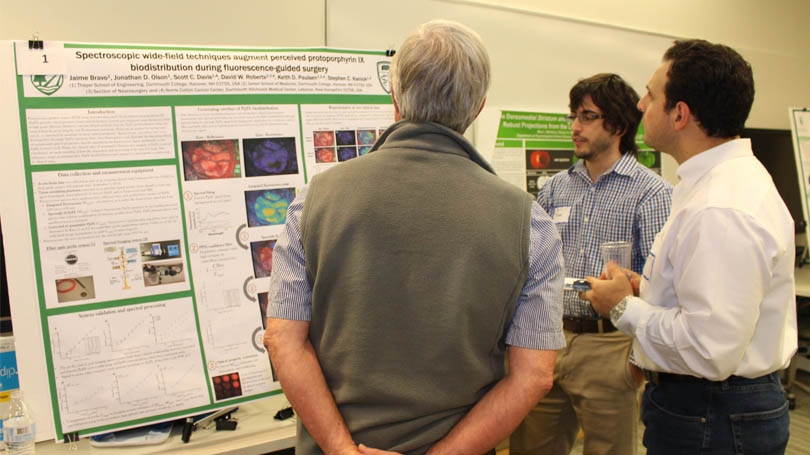
Judges gather around one of the posters presented at CBRaD (Photo by Alex M. Moushey '16)
The Second Annual Celebration of Biomedical Research at Dartmouth (CBRaD) attracted around 200 guests and presenters who gathered to share their research and compete in a judged poster presentation contest.
Programs represented in the poster contest included Chemistry, Molecular and Cellular Biology (MCB), Quantitative Biomedical Sciences (QBS), Thayer School of Engineering, Psychological and Brain Sciences (PBS), Program in Experimental and Molecular Medicine (PEMM), and The Dartmouth Institute (TDI).
The organizers of the event, PEMM coordinator Gail Egner and PEMM representatives Stephanie Getz and Itzel Rojas, hoped to create an exploratory atmosphere for scientists to share ideas, theories, and results. All of the presenters were accomplished in research, but CBRaD allowed them to develop the ability to speak about their topics with a non-specialized audience. Postdoc Steven Miller from the Yeh lab commented, “CBRaD provides a great forum to present your research in a simple and concise way to people that may be outside of your field—an important skill for writing Institutional Animal Care and Use Committee (IACUC), and grant applications.”
The judging panel, consisting of postdocs, faculty and senior students, had the difficult task of whittling the competitors from 84 to 8 and the decision to choose one winner would be a difficult one. While the winners of the competition posters were being calculated, raffle prizes of $50 gift cards to non-competitive poster presenters were awarded to Michelle Clay, Arijit Paul, and Arsa Thammahong; all from MCB.
After appropriate delegation over the 8 finalists, hosts Getz and Rojas announced the top three winners in the poster competition. In third place, MCB’s Harrison Jones from the McClellan lab presented about an alternative conformation of the respiratory syncytial virus (RSV) F protein. The F protein is naturally flexible and can adopt subtle, yet distinct states. His work focuses on how these small changes affect the triggering of the F protein and downstream infection of RSV.
Arielle Baker, from the Gulledge lab in PEMM, won second place with her discussion of different neurotransmitters controlling the output of cortical projection neurons. Her studies have uncovered discrete modulation of certain neurons depending on their morphological and physiological properties, where in the brain they send information to, and what receptors they express.
In first place, Jennifer Lai from the Ackerman lab in the Thayer School of Engineering spoke about her studies in designing synthetic vaccine antigens to mimic HIV. In the future, her designs may be able to focus the natural immune response on HIV in a vaccine form in order to prevent infection. When asked about the prize, which was an iPad, she said, “I didn’t do it for the prize.” However, after consulting her friends, she made it clear her first order of business was to download the game “Plants vs. Zombies.” Lai said she enjoyed the event and advised other scientists to, “Pick what you love. Then work really hard at it.”
In addition to the student winners, the contest for the best mentor was also announced. Dr. Farran Briggs was announced the best mentor by her graduate student, Vanessa Mock. Mock explained how Briggs encourages her students to achieve beyond their potential to make important discoveries in their fields.
By the end of the night all the awards were announced and the general feeling was excitement as the scientists returned home to prepare for the research day ahead. The coordinators hope to continue to build on the success of the 2016 CBRaD and thanks everyone for coming out and making the event a success.